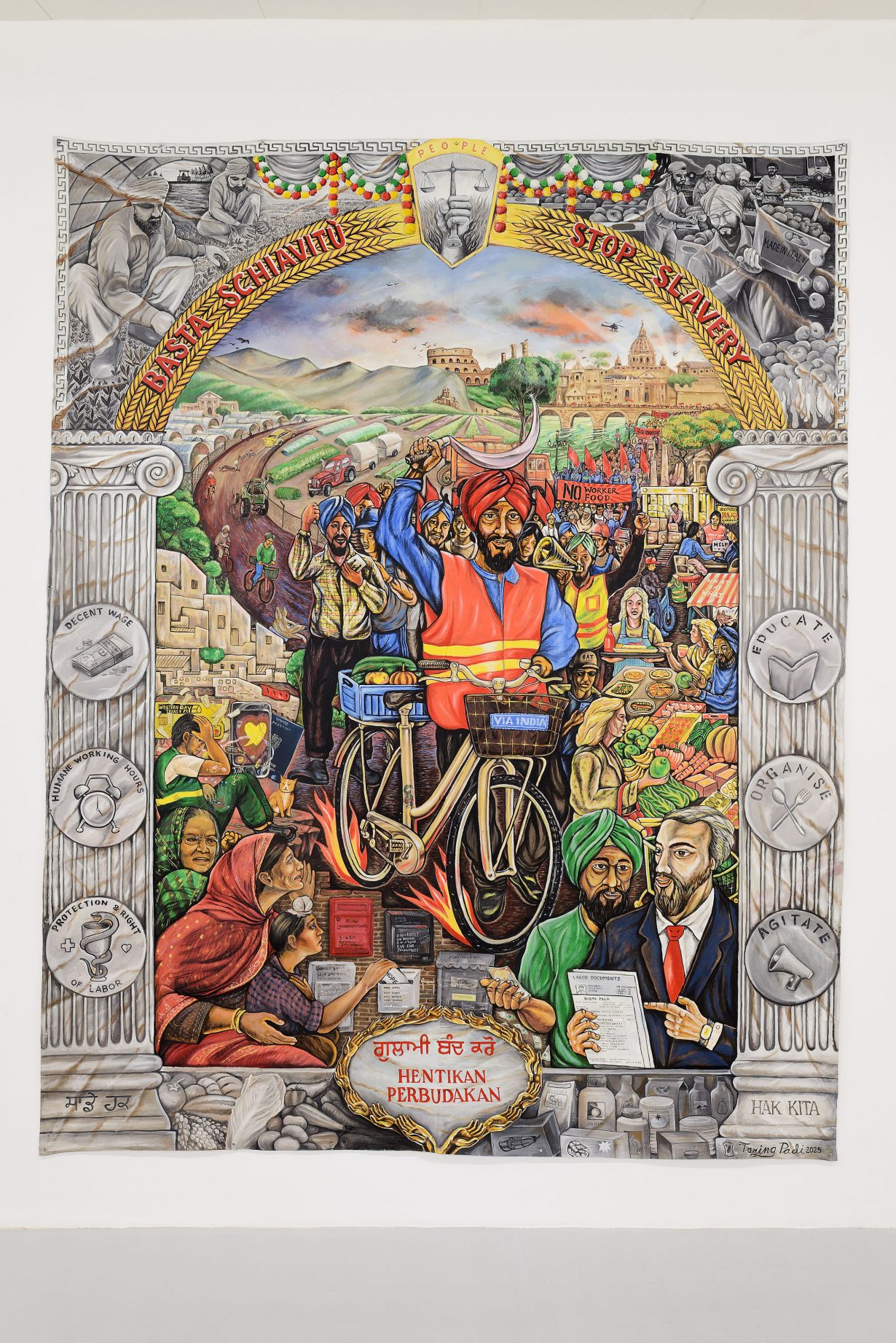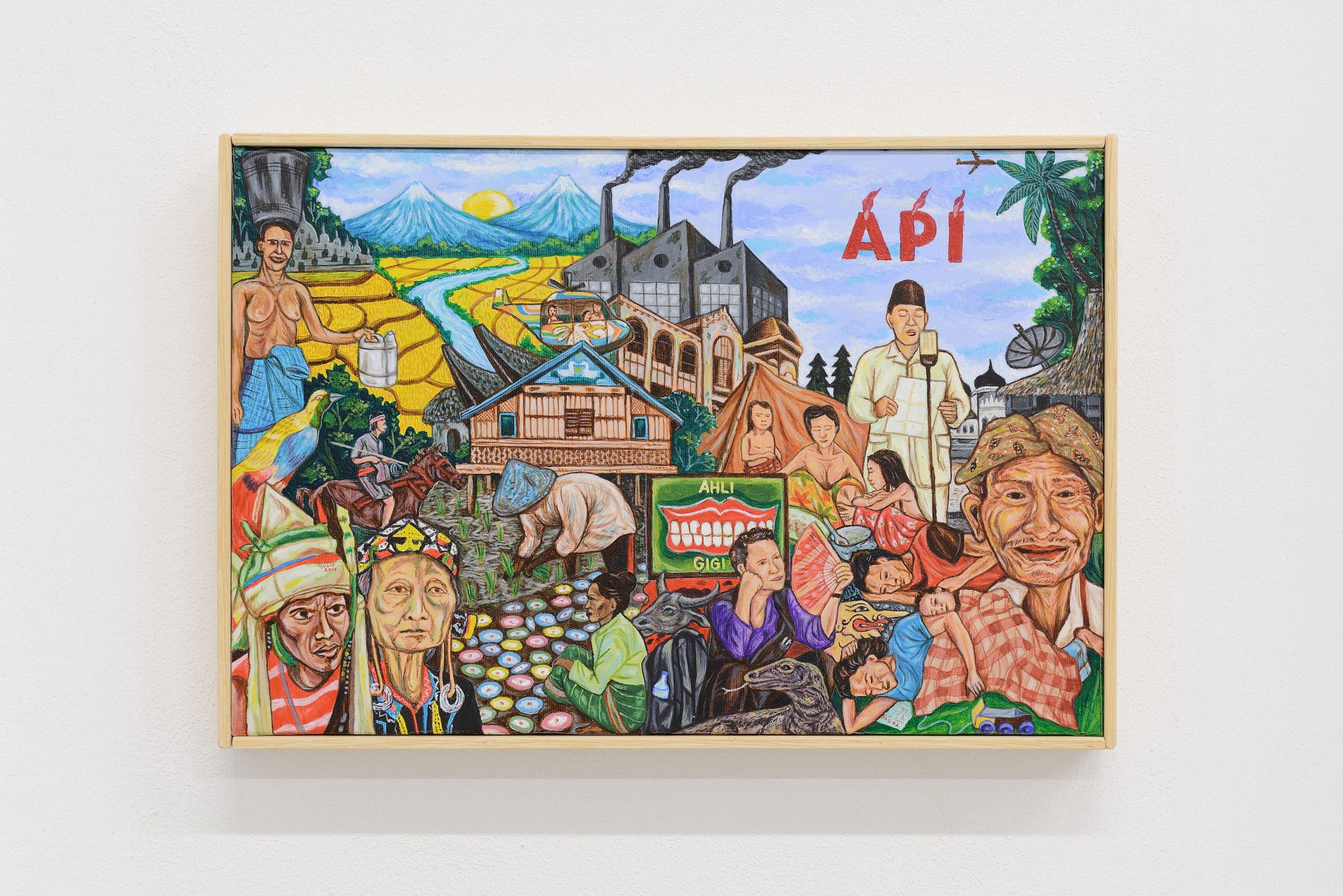Cantadora gallery opens in Rome with a striking sociopolitical show from the Indonesian art collective
In 2016, around 4,000 Punjabi Sikh farm labourers in the Agro Pontino, a stretch of reclaimed farmland some 60km south of Rome, struck for humane working conditions and pay. It was the first strike to openly protest the region’s now-banned, enslaving caporalato system: a practice with nineteenth-century mafia roots, wherein a landowner subcontracts a caporale (gangmaster) to recruit and pay day-labourers to work 12-hour days, six days a week, often in extreme conditions. Such is the fulcrum of Taring Padi’s monumental painted banner Hentikan Perbudakan / Stop Slavery (2025), created during a residency in Rome. The Indonesian collective’s first show in Italy also includes 13 smaller works by five of its current 17 members: Ucup Baik, Fitri dk, Dodi Irwandi, Setu Legi and Surya Wirawan. These paintings, woodcut prints on fabric and etchings indicate how individuals’ styles inform the collective’s distinctive visual language: one rooted in and promoting the traditions of people’s art from Southeast Asia, rejecting art for art’s sake and using it instead to convey clear sociopolitical messages. Together, the works document, pay homage to and advocate for oppressed communities preyed upon by mining companies, and uphold student movements, farmers and unions fighting for a just, sustainable economic and political system. The focus is Indonesia, but the social justice struggles are present worldwide.
Taring Padi was formed by art students in 1998 in response to the sociopolitical upheavals of Indonesia’s reformation era. Their manifesto outlines a practice steeped in solidarity and collectivity, creating art and actions including woodcut posters, cardboard puppets, banners, music. Three founding principles – Organise, Educate, Agitate – underpin their ethics. The words, this show’s title, are declared on one of two ionic columns that frame the scenes depicted in the banner. An arch made of minutely drawn stalks of wheat connects the columns, declaring ‘stop slavery’ in Italian and English; the equivalent in Punjabi and Bahasa Indonesia is displayed in a medallion formed by upturned hands.

During September, the collective visited the Sikh community living and working in the Agro Pontino area, guided by activist/sociologist Marco Omizzolo, and spoke to union members. The resultant banner exposes the toxic interrelationships between the agromafia, the Sikh community it exploits and the ‘made in Italy’ produce sector that directly profits from it. The 2016 strike procession takes centre stage of the image, led by a turbaned labourer raising a sickle while pushing his bike – the standard transport mode for rural migrant workers in Italy. To the left is the landowner’s large villa, greenhouses hiding workers from plain sight; below are scenes of everyday life, some portraying in harrowing detail the cascading effects of the caporalato, such as addiction to productivity-boosting substances supplied by the gangmasters, or a gangmaster holding a labourer’s work documents and unfilled payslip. To the right we see ourselves – blissfully unaware yet complicit consumers who buy the produce from friendly local markets, while Rome’s gorgeous vistas loom over the Tiber in the foreground.
On the opening night, the collective performed their own wayang beber – a Javanese form of puppet theatre, where the epic narrated by the puppeteer, or dalang, is revealed on illustrated scrolls – titled Matahari Rakyat (The Light of the People, 2024). Crowds gathered around the seated performers and their instruments, the air thick with incense and soon with the sounds of gamelan accompanying an initial mantra to bless the new gallery. Surrounded by vibrant cardboard puppets made during a community-led workshop, depicting the likes of migrant workers, the flai union vans that support them and Palestinian flags, the dalang recounted the rousing tale of a family fleeing a gas leak that destroyed its village, culminating, through myriad encounters with other similarly disaster-stricken communities, in the building of a utopian community that mimics the collective’s own arc. Amid such stories of the exploited, oppressed and silenced, Taring Padi remind us that it’s high time to, indeed, organise, educate and agitate.
Taring Padi: Organise, Educate and Agitate!, Cantadora, Rome, through 4 December
From the November 2025 issue of ArtReview – get your copy.
Read next 10 exhibitions to see in November 2025
